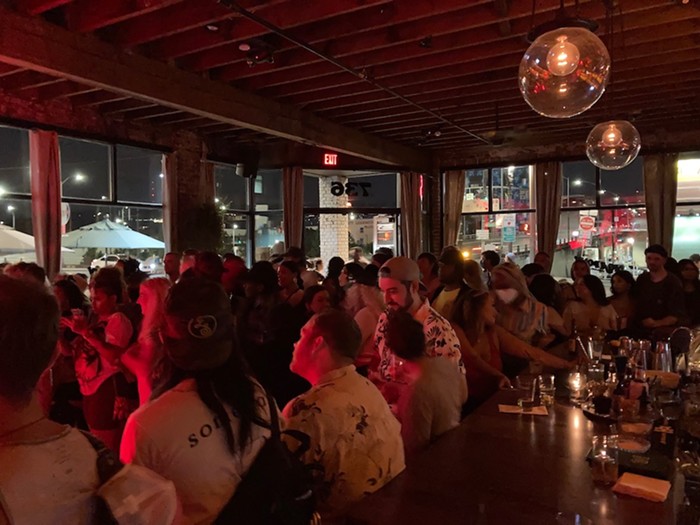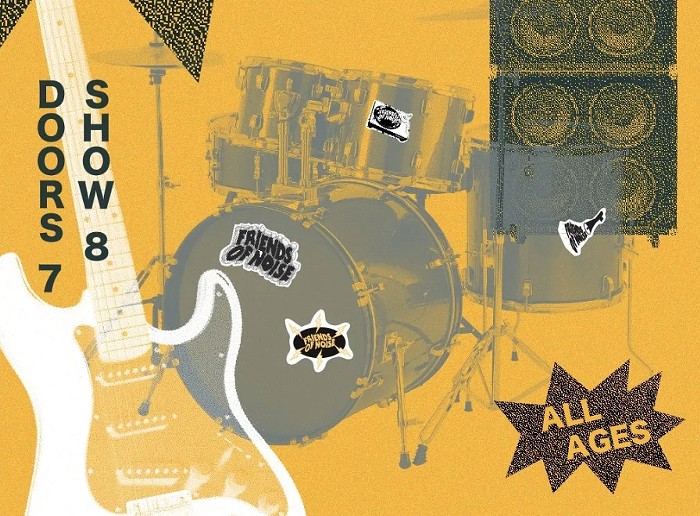
When Steve Hauschildt takes the stage at Holocene this Wednesday, June 19, it will be the first time the electronic artist/producer from Chicago has performed live in Portland as a solo artist. That’s a normal state of affairs for a newcomer, but Hauschildt has been making music to great acclaim since the early ‘00s on his own and as a member of the beloved trio Emeralds. Even though he did make it here on a couple of occasions with his former band, he somehow hadn’t added us to his tour schedule until this year.
The oversight was unintentional, Hauschildt says. And one that can be easily forgiven in light of the fine music he has release while we’ve been waiting for his arrival. After Emeralds split in 2013, Hauschildt dove into a full-time solo career, releasing a pair of stunning albums on Kranky—2015’s Where All Is Fled, which employed the pulse of arpeggiated melodies and taffy-like synth drones, and 2016’s Strands, a record that found him diving in similar waters while also dipping his toes into a bit of electro.
Last year, Hauschildt released the remarkable Dissolvi, his first for Ghostly International, and the first to find him trying his hand at material that could easily slip into the set of an adventurous DJ. Songs like “Lyngr” and “Aroid” find a perfect sweet spot where the worlds of the Midwest techno scene and the dreampop of groups like Slowdive and Seefeel share sensual accord. The album also features vocalists for the first time, with the experimental artists GABI and Julianna Barwick each contributing their voices to a track on Dissolvi. Both women add indelible texture and beauty to already gorgeous music.
In advance of his debut Portland solo performance, we hopped on the phone with Hauschildt to talk about the creation of Dissolvi, working with singers for the first time, and the changes his music has undergone over the past decade.
MERCURY: I wanted to talk first about the most recent album you’ve released, 2018’s Dissolvi. It feels like it has a much more direct feeling to it and I hear the influence of techno in a big way on that record. What can you tell me about that shift or what led you down that path?
STEVE HAUSCHILDT: I wouldn't really necessarily consider it a shift. I would say that it was it was like a harkening back to some of my earliest influences and just kind of displaying that more explicitly. By that I mean like Detroit techno and like music that came out of like the UK in the late ’90s. I think it was like certainly something that I'd been wanting to do more of. I think being on a different label… after having released four records for Kranky, moving over to Ghostly opened up some things creatively. Not that I was limited in any way by working with Kranky. I have a tremendous amount of respect for them. I just don’t think I could have necessarily made that kind of album for them. I don’t even think I would have wanted to.
Were things you were listening to early on that piqued your interest in electronic music?
Autechre was one of the huge ones when I was younger. And Drexciya. When I heard them in my teenage years, I just didn't like have any context built up for it or any understanding of how the music was made whatsoever. Even today when I listen to some of our Autechre’s music made in the last 10-15 years, I still don't know. There's a beauty to that. There's something that's really nice about the unknown and not knowing how something is made that is inspiring. More so than trying to emulate or rip something off. It drives you to create your own kind of sound world.
Was looking back to the work of those Detroit producers and 12”s from the ‘90s in part what inspired you to include vocalists for the first time in your solo work?
That wasn't really a consideration. It’s something that I had been tossing around for a long time. My old band Emeralds started out as vocal-only. Not in a pop kind of context. It was like vocal drone with lots of reverb. It was very primitive. We came out of the noise underground, for lack of a better term, and that was just our expression. Later on, we adopted synthesizers. All of that came after I had heard some of the music coming out of Detroit and the UK and elsewhere that was inspiring to me. It’s more like a full circle kind of thing as opposed to trying to branch out and do something new.
What can you tell me about the voices you chose to highlight on Dissolvi: Julianna Barwick and GABI?
I’ve known Julianna for eight or nine years. I’m a huge fan of hers. Her vocal range and creative expression are really quite remarkable. So working with her was kind of a no-brainer. Gabrielle [Herbst, AKA GABI], she had released something on Software, which was run by Dan Lopatin, who records as Oneohtrix Point Never. Her contributions to [“Syncope”] fit that track really well. She recorded a few takes with Rafael Irisarri, who helped engineer the last record. I’m definitely pretty pleased with the collaboration but how it really showcases their talent as opposed to just making the track better. It’s important to focus on how good they sound. At least when I’m listening to it. I’m always picking out the flaws in my own music when I’m listening to it, so it’s nice to have contributors and collaborators because it’s something else for me to appreciate.
How much did their contributions change your perspective on the songs as you were making them? Did you have to make adjustments to them as a response to that?
I did some of the arranging of the vocal tracks once they recorded them and moved them around. The songs aren’t in a normal pop structure. The vocals took it outside of my normal comfort zone, but still kind of is entrenched in some of the themes and like stylistic choices I’ve made in the past as well. It was definitely an experiment for me to do something like that. It was dependent on having resources and a budget and having the right people involved in. Having the appropriate vocalist. I was really happy to be able to work with both of them.
As you said before, you’re now signed with Ghostly International. How did that come about?
I’d met Sam Valenti [founder of Ghostly] and Molly [Smith] who’s their production manager when I would come through New York City and play shows. I think the first release I worked on for them was a remix for one of their artists, Lusine. Shortly after that, I submitted an album to them, but they couldn’t really fit it on their plate. I ended up signing a publishing deal with them two or three years ago. I think just by extension of that, once I had finished Strands, my last record for Kranky, Ghostly approached me about signing a contract. It made a lot of sense. I always work with people that I’ve met in person and that I can trust. They’re a really great team of people. It’s the same with Kranky. I don’t think I’m necessarily done working with Kranky. It was so much a departure but just opening up to a new audience.
Although you released solo music even during your time as a member of Emeralds, did you feel any kind of outside pressure or expectations about your solo stuff after the bands split up?
When the band broke up, it was like losing a full-time job. We were touring a lot and making money on the road. There was a lot going on and we just pulled the plug. It took me, I want to say, three years to put out a new solo record. Although, in 2013, I did release a double CD compilation on Editions Mego that was, for me, a way of encapsulating my work over the course of a decade or so and just wrapping it up and putting it behind me for lack of a better term. 2015 saw the release of Where It All Fled and then the next year was Strands.
The band was over, essentially, in 2012 even though it wasn’t publicly announced until the next year. Once it was, it really affected us all very heavily. I still get along with both of them. I don’t harbor any resentment or ill will. But it was an inevitable thing. Then we had to accept the consequences of that and part of that, for me, was that I had invested all this time and energy into the band. So it was hitting the reset button and totally refreshing my solo career.
How has your approach to making music changed, both in terms of what equipment you use and your mindset toward writing and recording? Has it changed considerably over the years?
Yeah, it has. I never went to school to learn recording or even music in a technical sense. All of that was always an auto-didactic thing for me. And having that provides certain advantages and disadvantages. When Emeralds started out, it was just a microphone and maybe a reverb or delay pedal. And that’s it. We slowly built things up from there. There were a number of different synthesizers that I acquired that laid a foundation for me. I’ve been getting more into modular synthesis and into digital signal processing. Having spent more time with mastering engineers like Taylor Deupree and Rafael Irisarri has really opened up my eyes to the possibilities of actual music production and mastering equipment. I’ve changed my approach in some ways and I’m starting to retool my own home studio to be more self-sufficient.
What comes next for you?
I finished a new record and, if the production schedule goes how I hope it will, it will be out in the fall. I’m still going to be traveling and touring. I have some plans to go to Tromsø, Norway and Wrocław, Poland and do some extensive touring in Europe around then. Now that I have that album done, it opens me up to work on new recordings and rebuild my studio. I’ve been selling some things and acquiring some new things, so it’s an exciting time.
Steve Hauschildt performs at Holocene on July 19, 8:30 pm, $10-12, w/Patricia Wolf and Michael Vallera


















